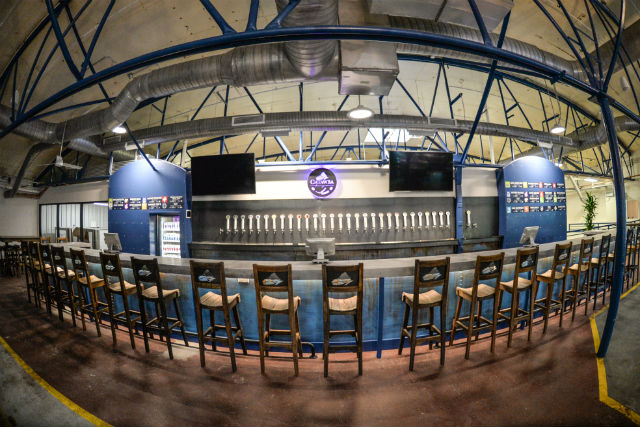
For most brewery owners, the start of a company meant a few people putting together a business plan and building from there. Eventually, though, there does come a point where the amount of hats needed in day-to-day operations becomes too much, and finding key new employees becomes a focal point.
As The Alchemist has intentionally grown slowly over the last 20 years — starting at 450 barrels to now producing 19,000 barrels annually — Jen Kimmich said the main focus has been quality, consistency, and authenticity.
Over the years the popular Vermont brewery has worked at adding positions, she said. That included an office manager/bookkeeper; operations manager; CFO; creative/social media manager and more.
“As we create new positions and hire new people, we focus on training that one person,” Kimmich said. “We (her and her husband John Kimmich) personally will work with them, as well as our amazing team to give them the most comprehensive training that encompasses everything we care about — beer, community, workplace, and environment.
“Slow growth has allowed us to focus on new people, not new departments. And through this commitment, we can retain those valued employees.”
Joe Short of Short’s Brewing saw a tipping point of sorts in needing to add people to help balance out what his responsibilities were at the time when the Northern Michigan brewery added a second facility in a separate location.
“I couldn’t be in Bellaire and Elk Rapids at once,” he recalled, “so I had to develop departments and clearly communicate expectations to maintain the culture that exists today.”
One of the key parts of being a leader and manager, Short said, is having the ability to inspire people or excite them.
“When you’re genuinely excited it’s contagious and it spreads to your team and then they get excited,” he told Brewer. “I wholeheartedly believe the Short’s was built on being excited about what we were doing. We are proud of what we make and are excited to share it, we want you to feel that excitement, it’s part of our experience.”
But from the products Short’s makes to the facilities they manage and the people they hire, Short said they had to communicate that ethos somehow.
“Up to that point, it was me, Tony Hansen, and Leah (my wife) running the Pub hospitality and brewing operations with the help of key staff members like Woj (Head of Sales, Jon Wojtowicz) and Scott (Newman-Bale, now CEO),” Short said. “Scott was our lifeline when we didn’t know what we were doing, that’s why we call him the Magician.
“It was a good team for the size we were at when we were the original Pub before we started adding buildings. The original kitchen and brewery were as big as a closet.”
Figuring out how to motivate and communicate with different people who have different learning styles was a big learning curve for Short.
“I try to bring enthusiasm but can get frustrated, so it’s a delicate balance to keep folks motivated and keep standards up,” he said. “I personally love physical labor and that’s my preference, so the most difficult part for me is not being able to do the actual work.
READ MORE: Strategies in Employing Employee Management Software
“Writing job descriptions and SOPs sucks the life out of me. I’d rather show someone how to do a task and work alongside them. Someone once told me ‘If you want to be a brewer, don’t start your own brewery.’
“But I love every day being different and bouncing around to do all different things.”
A key to New Realm’s success has been because the brewery created a detailed roadmap to follow by its founders and leadership team that had nearly a century’s worth of beverage industry experience. As CEO, Carey Falcone said they set up a detailed strategic business plan and annual budgets for each department.
“There is sometimes a misconception that craft breweries are unsophisticated and poorly run,” Falcone said. “New Realm has built a leadership team that shares core values, a passion for beer and food, and deep industry knowledge.”
The Entrepreneurial Operating System (EOS) business management system is utilized as a set of practical tools and concepts to achieve the New Realm vision. Each year, after gathering insight from external industry professionals to understand the changing landscape, tactics are developed by the department to deliver the strategy and budget.
For The Alchemist, growth has been slow and deliberate, Kimmich pointed out, with the goal of continued independence and autonomy.
“We have been very successful, but between our two production breweries we craft less than 20,000 barrels per year,” she said. “Sure, we could brew more, but this lower production rate has allowed us to retain control over everything that matters most to us.
“We know lots of brewery owners that are more comfortable with rapid growth and are focused on market share, but that has never been our goal. We have always been more comfortable with restrained, sustainable growth that allows us to retain our ability to craft small-batch beer. This doesn’t mean John and I manage and execute everything; we have an amazing team.”
The biggest challenge can be really caring and taking ownership. That means looking at everything — from the beer, your service staff and beer pours, to the cleanliness of your bathrooms.
“You can’t really ‘learn’ how to care,” she said. “But a manager really does need to care about the company, the workplace culture, and product/services to be effective and meaningful.
“A new manager who shares your values and mission will be much more effective (and better to work with), than a person with a lot of experience but with misaligned values — hence the importance of workplace culture and community.
“We always say, ‘We can train bright, like-minded people with little experience, but we can’t train people who don’t share our values and goals.’ And of course, a good manager needs to care about — and show that care to — their employees, first and foremost.”
For staff members who are moving into management roles, Falcone said it’s important to hire experienced, diverse, smart, and passionate people.
“Then empower those individuals to make decisions and, most importantly, realize that as a leader, you work for your team, not the other way around,” he said. NRBC believes in servant leadership and Falcone said that the leadership team is in place to provide direction and support while removing barriers and providing the tools to ensure that every member of the organization is successful.
“One of our core behaviors states that if you are not serving a customer, you had better be serving someone who is,” he said.
Ask lots of questions, Short said to other managers moving into these new roles.
“And before you get into a teaching moment, probe your management for as much info as possible,” he said. “Work with your team to establish a common goal — for us, it’s Creating Exceptional Short’s Brewing experiences — and work backward from it.”






2 Trackbacks / Pingbacks